|
|
|
Sort Order |
|
|
|
Items / Page
|
|
|
|
|
|
|
| Srl | Item |
| 1 |
ID:
178191


|
|
|
|
|
| Summary/Abstract |
Three colleagues pay tribute to Greg Donaghy, who at the time of his death on 1 July 2020 was the co-editor of International Journal and Director of the Bill Graham Centre for Contemporary International History at the University of Toronto. Dr Donaghy’s imaginative international history expanded the canvas of Canadian foreign policy beyond the traditional limits of the North Atlantic Triangle. As an author, editor, and mentor, he redefined the way that Canada’s world looks to its scholars.
|
|
|
|
|
|
|
|
|
|
|
|
|
|
|
|
| 2 |
ID:
178203
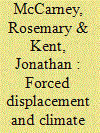

|
|
|
|
|
| Summary/Abstract |
Climate change and its relatively slow-onset effects like sea level rise, desertification, and water salinization and associated sudden onset effects like floods, hurricanes and droughts, is perhaps the major emerging risk to rich and poor nations and the most vulnerable people within them. But the current system of global governance is entirely insufficient to cope with, let alone effectively respond to, the looming crisis of climate displacement. This policy brief discusses the current state of the global governance of climate displacement and identifies a number of substantive and organizational legal and policy elements in need of rapid implementation and development. The intent of this brief is to inform public debate and policy discourse on the challenges and opportunities toward improving the global governance of climate displacement.
|
|
|
|
|
|
|
|
|
|
|
|
|
|
|
|
| 3 |
ID:
178195
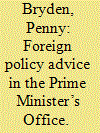

|
|
|
|
|
| Summary/Abstract |
The Department of External Affairs (DEA) has always been anomalous—more closely associated with the prime minister than any other department, yet also more independent from cabinet in its necessarily far-flung structure than any other department. The unique position of the DEA has meant that its influence has been closely tied to changes in the structure of the Prime Minister’s Office (PMO). This article examines the ways that the advisory capacity of the DEA has gradually been eroded, while the foreign policy advice from the PMO has concomitantly increased, in the period between the 1930s and the 1990s.
|
|
|
|
|
|
|
|
|
|
|
|
|
|
|
|
| 4 |
ID:
178201


|
|
|
|
|
| Summary/Abstract |
This paper examines how China and Russia play into the opportunities and constraints that shape Canadian foreign policy. While both countries contribute significantly to the challenges of twenty-first-century world politics, neither is a juggernaut: both face serious internal difficulties and fear the West in ways that should temper our preoccupation with relative decline. The paper concludes that, by seeing these authoritarian powers as more fragile than frightening, Canada can worry less about how engagement might be seen to reward bad behaviour and more about beneficial outcomes in areas that serve Canadian interests.
|
|
|
|
|
|
|
|
|
|
|
|
|
|
|
|
| 5 |
ID:
178198


|
|
|
|
|
| Summary/Abstract |
“Strategic culture” is one of those conceptual bridges that link history with political science because, among other reasons, it reminds us of the hold that memories of past events can continue to exercise upon contemporary reality. But those memories are always subjective, sometimes downplayed to the point of nearly being forgotten altogether, at other times so overstated as to yield a highly distorted sense of the past and of its relationship to the present. This article constitutes a revisitation of contemporary Quebec strategic culture, from the perspective of historical memory. That strategic culture has of late been so strongly stamped with the impress of a “Pearsonian internationalism” that it becomes easy for analysts to confuse it with “pacifism.” Yet it has also been a strategic culture that stems from a great deal of historical amnesia. What has been effaced from the collective memory is the long period in which war was endemic in New France—the period that gives the lie to the notion of Quebeckers somehow being a “pacifistic” folk. This was the sanguinary era upon which the historian Francis Parkman focused such a large share of his prodigious intellectual energies. Only the closing act of this era seems to have escaped erasure from Quebec’s collective memory. Indeed, that act, which took place on the Plains of Abraham, has been “remembered” only too well. So well has it been recollected, in fact, that it has fostered within Quebec society the unshakable conviction that, for Quebeckers, war must always be a risky undertaking susceptible of leading to catastrophe.
|
|
|
|
|
|
|
|
|
|
|
|
|
|
|
|
| 6 |
ID:
178200
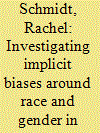

|
|
|
|
|
| Summary/Abstract |
A growing body of research on terrorism and countering violent extremism (CVE) has increasingly questioned the lack of attention to—and myths around—women involved in extremist and political violence, while other research has drawn attention to racial and religious stereotypes that affect national security policies and practices worldwide. While Canada is often heralded as a global leader in multiculturalism and gender equality, the nation’s national security sector still faces significant challenges around implicit biases related to race and gender. This study asks whether gender and racial stereotypes impeding counterterrorism and CVE in other countries are also affecting policies and practices in Canada. Using twenty-six in-depth interviews with practitioners, police officers, academics, and government officials from seven major cities across Canada, this paper argues that persistent gender and racial stereotypes are indeed a key challenge impeding Canada’s efforts to adequately address radicalization into and disengagement from extremist violence.
|
|
|
|
|
|
|
|
|
|
|
|
|
|
|
|
| 7 |
ID:
178197


|
|
|
|
|
| Summary/Abstract |
This article takes up the concept of mental maps as lens through which to survey Canada–Asia relations. Before Canadians could embrace Asia politically and economically, they had to stop imagining Asia as culturally distant. Their mental maps—the way they imagined the world—formed the invisible background to policy-making. Through an engagement with Greg Donaghy’s work on Canadian relations with Asia, this article makes the case for using mental maps to understand trans-Pacific relations.
|
|
|
|
|
|
|
|
|
|
|
|
|
|
|
|
| 8 |
ID:
178194
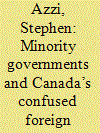

|
|
|
|
|
| Summary/Abstract |
Three case studies demonstrate that federal limits on foreign investment in Canada have been motivated by political not economic considerations. The cases—the abortive 1963 tax on foreign takeovers, the 1973–1974 creation of the Foreign Investment Review Agency, and the 2008 and 2010 decisions to block the purchase of two Canadian companies—shared many features. All three involved minority governments that were vulnerable to shifts in public opinion. All three governments were skeptical about turning away foreign capital. Yet all three undertook measures to limit investment. All three then abandoned the policy as soon as political circumstances changed. This decision-making process helps explain why Canadian foreign investment policy has often been confused and inconsistent.
|
|
|
|
|
|
|
|
|
|
|
|
|
|
|
|
| 9 |
ID:
178204


|
|
|
|
|
| Summary/Abstract |
One of the most debated and criticized characteristics of the Global Compact for Safe, Orderly and Regular Migration (GCM) is its legally non-binding form. This article analyzes the GCM’s legal form, mechanisms of effectiveness, and legitimacy and finds that while the legal form of the GCM is important, the available mechanisms of effectiveness and legitimacy are equally or, perhaps, more important factors to determine the compact’s relevance and future impact. Although non-binding, the GCM does possess the relevance, capacities, and legitimacy to become a normative force in the field of international migration governance. Compliance with its outlined commitments will, however, be strongly dependent on the political will of the participating states. Perhaps its key function will be to fill the existing gaps in hard law in global migration governance by fostering cooperation and consolidating international obligations, standards, and stakeholders of a crosscutting topic into one instrument.
|
|
|
|
|
|
|
|
|
|
|
|
|
|
|
|
| 10 |
ID:
178199
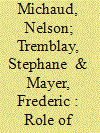

|
|
|
|
|
| Summary/Abstract |
Foreign policy statements—and, namely, white papers—offer diplomats, civil servants, and the general public, as well as international actors (friends and foes alike) an understanding of what motivates a country to engage in international issues. They are fundamental government declarations intended to direct the policy process toward its political and operational objectives. Is history embedded in the message these statements carry? And, if so, how is history used? Relying on Brands and Suri’s typology and framing categories (factual/normative), this article explores white papers issued by governments led by Pierre Elliott Trudeau, Jean Chrétien, Paul Martin Jr., as well as the 2017 House of Commons statement by Justin Trudeau’s foreign affairs minister, Chrystia Freeland. Based on Canada’s tradition of Pearsonian internationalism, we hypothesize that the factual use of history would prevail. We find this to be the case, but with important nuances.
|
|
|
|
|
|
|
|
|
|
|
|
|
|
|
|
| 11 |
ID:
178202
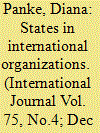

|
|
|
|
|
| Summary/Abstract |
States address many of today’s global problems in international organizations (IOs). At the same time, regional international organizations (RIOs) play important roles in IOs, as a series of case studies suggests. RIO member states can speak on behalf of an RIO in IO negotiations. This paper explores under what conditions states voice RIO positions instead of national ones in IOs and thereby turn into agents of regionalization. Based on a novel dataset of more than 500 international negotiations and a quantitative analysis of theory-guided International Relations hypotheses, this paper shows that states are increasingly likely to negotiate on behalf of an RIO, when they regard grouping positions into regional blocs in IO negotiations as more effective, when they have a formal role as RIO chair, and when they possess financial and staff capacities needed in order to voice a regional position in international negotiations.
|
|
|
|
|
|
|
|
|
|
|
|
|
|
|
|
| 12 |
ID:
178193


|
|
|
|
|
| Summary/Abstract |
From 1947–1972, the Joint Arctic Weather Stations (JAWS) program transformed Canada’s High Arctic. This article focuses on Canada’s aspirations to “Canadianize” the joint program from the late 1940s to the late 1960s. Both Canada and the United States questioned the extent and form of American involvement in the JAWS program intermittently over 25 years of joint operations. Was Canadianization of these remote weather stations necessary or practical? This article concludes that, in retrospect, the conventional, dominant narrative that emphasizes the ongoing American threat to Canada’s Arctic sovereignty seems misplaced with respect to the JAWS story.
|
|
|
|
|
|
|
|
|
|
|
|
|
|
|
|
| 13 |
ID:
178192


|
|
|
|
|
| Summary/Abstract |
Drawing on newspaper and archival sources, this article examines post-war Canadian attitudes towards Dwight D. Eisenhower, particularly during his time in office as the United States President from 1953 to 1961. Eisenhower emerged from the Second World War as a trusted figure for many Canadians due to his inspiring leadership of the Allied cause. Once in the White House, however, his reputation began to suffer, and public opinion in Canada increasingly questioned core elements of the traditional Canada–United States relationship and America's ability to lead the Western alliance during a period of heightening Cold War tensions.
|
|
|
|
|
|
|
|
|
|
|
|
|
|
|
|
| 14 |
ID:
178196


|
|
|
|
|
| Summary/Abstract |
The United Nations Security Council (UNSC) is a place where states can seek international status by campaigning for its elected seats. I understand status as membership in a club and examine both the nature of the hierarchies of status and the responsibilities associated with that membership. To do this, I examine Canada’s first two campaigns to the Security Council in 1946 and 1947 in the context of the origins of the UN. I make a twofold argument. First, I argue that the hierarchy of the UNSC in the late 1940s was an imperial one, within which states campaigned for seats by articulating their relationships to these imperial formations. Second, I argue that the process of campaigning is also a process of claiming to take on the responsibilities of the UNSC’s mandate.
|
|
|
|
|
|
|
|
|
|
|
|
|
|
|
|
|
|
|
|
|